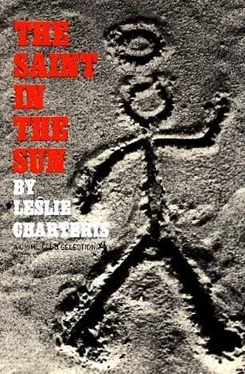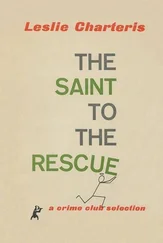"Why in another boat?" Simon inquired.
"To make a mystery. Like the famous Marie Celeste, the ship from which all the passengers and crew disappeared and left everything in perfect order. This was the work of an artist!"
His wife studied him fixedly.
"You are not often so quick to talk," she said. "Be careful that someone does not think you are describing yourself."
She had not given the Saint more than the most perfunctory recognition at the beginning, and she continued to ignore him as calmly as if they had never had anything but the casual introduction of the previous evening. It was hard even for him to believe in the reality of the tempting pressure of her body and the tantalization of her mouth that he had known in between, or the monstrous bargain that she had offered. Indubitably she was an actress with more intelligence than her detractors gave her credit for; and if only as a tribute to that talent he had to nudge her off a hazardous tack.
"If there's going to be any murder investigation," he said, "we might all have to look to our alibis."
"Lee and I could have nothing to do with it," she said scornfully. "All this morning we were in Nice, at the studio, where I do an interview for the television. And afterward we have lunch with a reporter from France-Soir. And we come back to our hotel, the Pinède, for the siesta. We have no time for anything else."
"Simon and I were together," Maureen said, "from — when was it? — about a quarter to one until we met Mr. Wilbert just now."
"I was at the villa," Wilbert said weakly. "Doing the petty cash accounts, going through letters, making a few phone calls—"
He was suddenly very helpless and bewildered.
"Alors," said the police sergeant, who had been trying to regain command for a long while, "there must now be a proper statement from everyone."
"By all means," said the Saint. "And let me start with a simple debunking of the whole razzmatazz. Undine was drunk last night, as witnessed by Miss Herald and doubtless many restaurateurs and waiters. This morning he had the gueule de bois. He also had an important business meeting to cope with. He went out for a spin in the speedboat to clear his head. And everyone knows he was a crazy boat driver. He made a turn too fast, and in his condition he lost his balance and fell overboard, and the boat went on without him. And let us all think kindly of him when we eat lobsters."
There was a sequel to this rambling anecdote almost a year later, when a production entitled Messalina, in Colossoscope and Kaleidocolor, was world-premiered with all the standard fanfares at the Caracalla auditorium in Rome, Italy, with simultaneous openings in six other towns called Rome in the United States.
Simon Templar, who was by nature attracted to such functions as irresistibly as he would have been drawn to a cholera epidemic, was a notable guest; and one of the first personages that he encountered was a ginger-haired bat-eared apparition upon whom a white tie and tails conferred an appallingly pasteboard dignity.
"I gather that you were able to satisfy the flics about the loose joints in your alibi," Simon greeted him genially.
"Of course, they had to accept it eventually." Wilbert inevitably reddened. "They could hardly get around the various people I'd talked to on the phone, which wouldn't have given me time to get far away from the villa. But it was rather awkward when it came out that Sir Jasper had made me the trustee of his will, and it was so loosely worded that I could do almost anything I liked."
"What did he leave his money to?"
"Most of it to found a motion picture museum, with the provision that one whole section has to be devoted to relics of himself and his productions."
"Modest to the last," murmured the Saint. "Well, you certainly gave him service while he was alive. But what I liked best was the way you cleaned up his boat the last time. If you hadn't been so conscientious, we wouldn't have had the cigar-ash clue."
"That didn't make a lot of difference, did it?"
"It helped, Wilbert. It helped."
Dominique Rousse was posing for photographers while her husband stood a little apart, watching with his usual introspective detachment.
"Good evening, Mr. Thomas," he said ironically, as Simon came towards him. "I suppose you couldn't wait to see how the picture turned out."
"I do feel a sort of personal interest," Simon confessed.
"I think you'll like what I did with Maureen Herald's part. It is big enough to justify her co-starring, without upsetting the balance of the play."
"Or upsetting Dominique, no doubt," said the Saint. "You don't need me to tell you you're a good writer. But you ought to be more careful of your own dialog."
"In what way?"
"You must know that one of the stock routines for a character to trip himself up in a detective story is to talk about a murder before he's been told that there's been one. If that police sergeant had understood English and been on the ball when you dropped that clanger, you might have had to finish your script in the pokey."
One of the photographers recognized the Saint, grabbed him unceremoniously, and dragged him over to Dominique.
With her sullen beauty, and a rope of diamonds twined in her red-blonde hair, and her stupendous figure revealed by a skintight green silk sheath cut low enough to prove to everyone that her world-famous bosom owed nothing to artificial enrichment, it took no effort at all to visualize her as a queen who could have had a pagan mob at her feet, even though she had demonstrated the moral instincts of a cat.
"Pretend to be pointing a gun at her," urged the photographer. "No, that's no good. Put a judo hold on her."
Simon took her by the wrist and twisted her arm gently behind her in such a way that she was pressed against him face to face.
"You could have done this long ago," she said in a whisper that scarcely moved her lips. "I told you I do not break my promise. Why have you not come to claim it?"
He smiled into her eyes.
"Some day I may," he said. "When I can make myself unscrupulous enough."
Finally he was able to rejoin Maureen Herald as another group of photographers tired of her.
"It was nice of you to come all this way to put up with this sort of thing," she said, taking his arm. "But I felt you ought to be here. After all, if you hadn't come up with the explanation of the Undine business, any of us might have been in an awkward spot."
"Somebody certainly owes me something," he admitted, "for helping to hide a murder."
They were moving into the theater, but she stopped to stare at him.
"You mean you've changed your mind since?"
"I always did think it was murder." He got her moving again. "It wasn't just the cigar-ash business, though that started me thinking. When Wilbert let out that Undine never took the boat out alone, I tried to fit that in. Then I remembered the clothes Undine was wearing, and that was the clincher. Undine's taste in color schemes was ghastly, but it wasn't monotonous. Undine wouldn't have just one hideous outfit, he'd 've had dozens, and he'd 've loved to knock your eye out with a different one every day. Therefore the man I saw in the boat on the second day wasn't Undine."
"Then who was it?"
"Somebody wearing his clothes and flourishing his cigar, padded out to his size with a cushion under the windbreaker. Between those huge sunglasses and the goatee, which could even have been his own hair glued on, at the distance the boat stayed out, it was easy to get away with. Hundreds of people would swear it was Undine they'd seen. But Jasper himself was probably in the bottom of the cockpit with the anchor tied to him, waiting to be dumped overboard out of sight off the cape. Then all the murderer had to do was head the boat out to sea, jump out at a safe distance, and swim back."
Читать дальше












